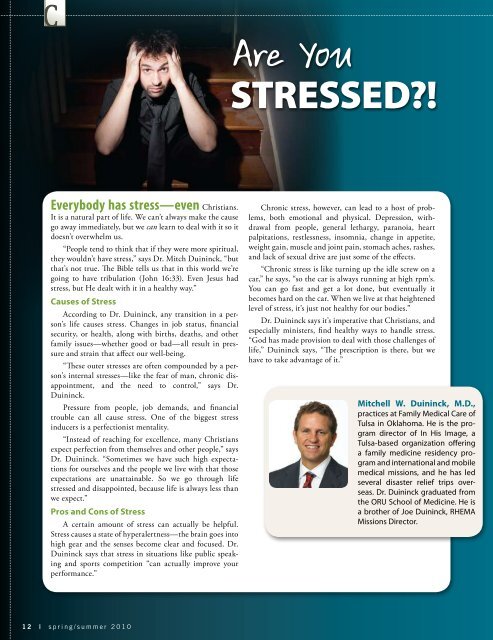You also want an ePaper? Increase the reach of your titles
YUMPU automatically turns print PDFs into web optimized ePapers that Google loves.
Are You<br />
Stressed?!<br />
Everybody has stress—even Christians.<br />
It is a natural part of life. We can’t always make the cause<br />
go away immediately, but we can learn to deal with it so it<br />
doesn’t overwhelm us.<br />
“People tend to think that if they were more spiritual,<br />
they wouldn’t have stress,” says Dr. Mitch Duininck, “but<br />
that’s not true. The Bible tells us that in this world we’re<br />
going to have tribulation (John 16:33). Even Jesus had<br />
stress, but He dealt with it in a healthy way.”<br />
Causes of Stress<br />
According to Dr. Duininck, any transition in a person’s<br />
life causes stress. Changes in job status, financial<br />
security, or health, along with births, deaths, and other<br />
family issues—whether good or bad—all result in pressure<br />
and strain that affect our well-being.<br />
“These outer stresses are often compounded by a person’s<br />
internal stresses—like the fear of man, chronic disappointment,<br />
and the need to control,” says Dr.<br />
Duininck.<br />
Pressure from people, job demands, and financial<br />
trouble can all cause stress. One of the biggest stress<br />
inducers is a perfectionist mentality.<br />
“Instead of reaching for excellence, many Christians<br />
expect perfection from themselves and other people,” says<br />
Dr. Duininck. “Sometimes we have such high expectations<br />
for ourselves and the people we live with that those<br />
expectations are unattainable. So we go through life<br />
stressed and disappointed, because life is always less than<br />
we expect.”<br />
Pros and Cons of Stress<br />
A certain amount of stress can actually be helpful.<br />
Stress causes a state of hyperalertness—the brain goes into<br />
high gear and the senses become clear and focused. Dr.<br />
Duininck says that stress in situations like public speaking<br />
and sports competition “can actually improve your<br />
performance.”<br />
Chronic stress, however, can lead to a host of problems,<br />
both emotional and physical. Depression, withdrawal<br />
from people, general lethargy, paranoia, heart<br />
palpitations, restlessness, insomnia, change in appetite,<br />
weight gain, muscle and joint pain, stomach aches, rashes,<br />
and lack of sexual drive are just some of the effects.<br />
“Chronic stress is like turning up the idle screw on a<br />
car,” he says, “so the car is always running at high rpm’s.<br />
You can go fast and get a lot done, but eventually it<br />
becomes hard on the car. When we live at that heightened<br />
level of stress, it’s just not healthy for our bodies.”<br />
Dr. Duininck says it’s imperative that Christians, and<br />
especially ministers, find healthy ways to handle stress.<br />
“God has made provision to deal with those challenges of<br />
life,” Duininck says, “The prescription is there, but we<br />
have to take advantage of it.”<br />
Mitchell W. Duininck, M.D.,<br />
practices at Family Medical Care of<br />
Tulsa in Oklahoma. He is the program<br />
director of In His Image, a<br />
Tulsa-based organization offering<br />
a family medicine residency program<br />
and international and mobile<br />
medical missions, and he has led<br />
several disaster relief trips overseas.<br />
Dr. Duininck graduated from<br />
the ORU School of Medicine. He is<br />
a brother of Joe Duininck, RHEMA<br />
Missions Director.<br />
12 | spring/summer <strong>2010</strong>

















